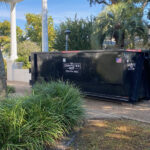When it comes to renting a dumpster, there are certain items and materials that you typically cannot put in them due to safety, environmental, or legal reasons. While the specific rules and regulations may vary depending on your location, here are some common items that are not allowed in dumpsters:
Hazardous Materials: This includes items like chemicals, solvents, pesticides, oils, asbestos, and any other substances deemed hazardous to health or the environment. These often require special disposal methods.
Electronics: Items like televisions, computers, monitors, and other electronic waste (e-waste) should not be placed in dumpsters. Many places have specific recycling programs for electronics.
Appliances: Large appliances like refrigerators, air conditioners, and washing machines may have specific disposal requirements due to their refrigerants and other components. Check local regulations.
Tires: Tires are typically not allowed in dumpsters because they can be problematic for landfills. Some recycling centers accept old tires.
Batteries: Household batteries, car batteries, and other types of batteries should not be disposed of in dumpsters. Many places have battery recycling programs.
Paint and Chemicals: Paint cans, varnishes, and other chemicals should not be placed in dumpsters. These often require special handling and disposal.
Medical Waste: This includes items like needles, syringes, and any other medical waste. It must be disposed of properly through medical waste disposal services.
Flammable or Explosive Materials: Items that are flammable, explosive, or potentially dangerous, such as propane tanks, fireworks, or ammunition, should never be put in dumpsters.
Concrete and Bricks: There are restrictions on heavy materials like concrete, bricks, and large quantities of dirt or rocks. They may have separate containers for these materials.
Large or Overweight Items: Dumpsters have weight limits, so be cautious about overloading them with heavy items that can exceed those limits.
It’s important to follow these guidelines to ensure safe and responsible disposal of waste materials. Violating these rules can result in additional fees or penalties. If you have any doubt about whether an item can go in the dumpster, it’s best to ask or seek alternative disposal options if needed.




